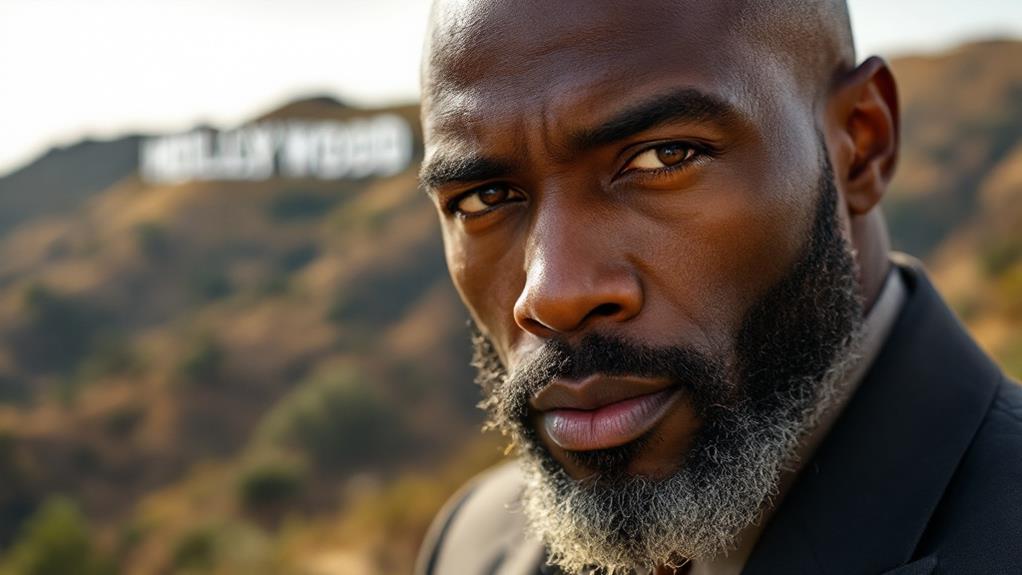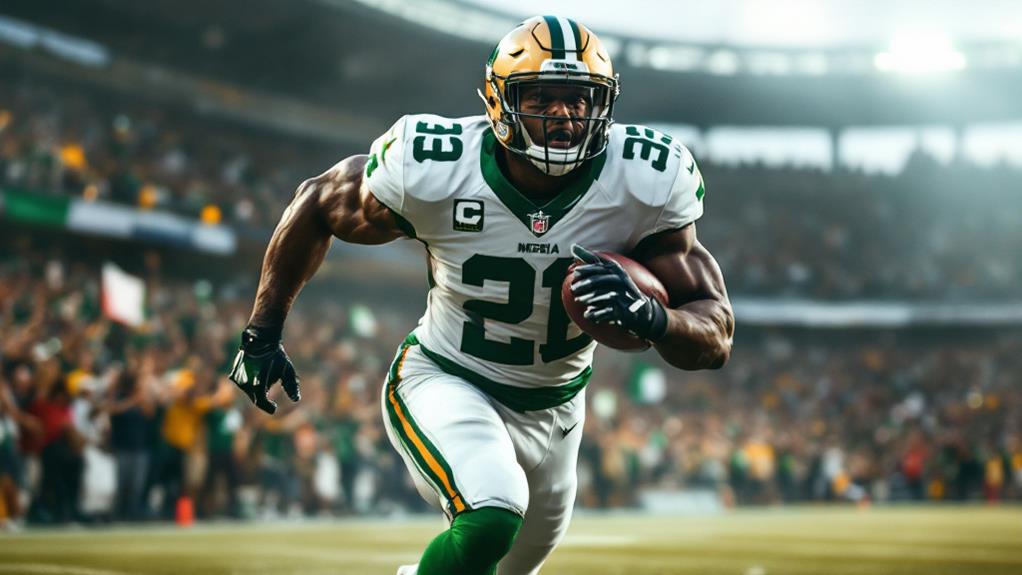Famous Nigerians: Influential Personalities Who Have Made Their Mark Globally
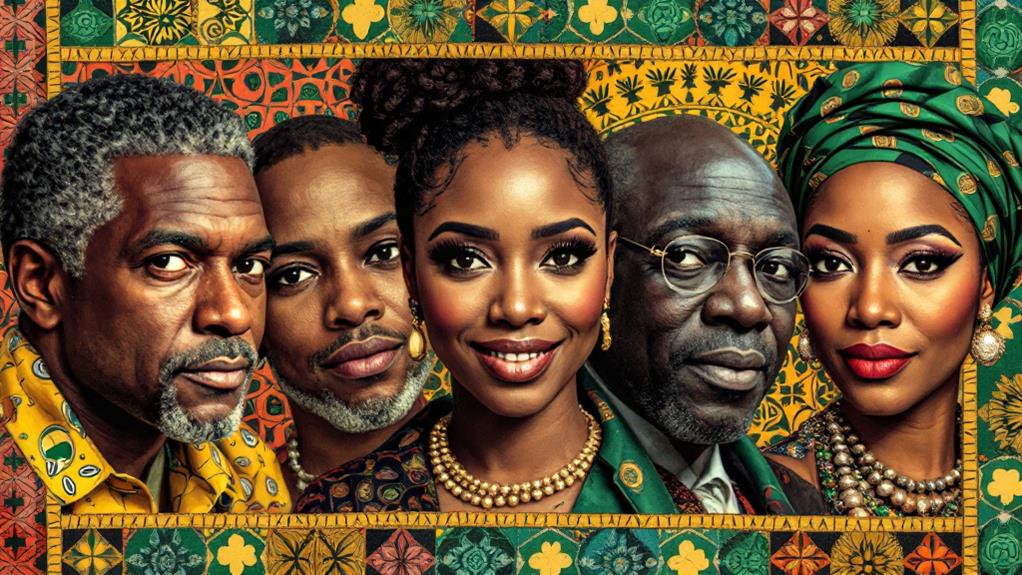
Nigeria has produced influential figures who've made their mark globally across various fields. You'll find icons like Fela Kuti in music, Hakeem Olajuwon in sports, and Ngozi Okonjo-Iweala in global leadership. Literary giants such as Chinua Achebe and Wole Soyinka have shaped world literature, while pioneers like Philip Emeagwali have advanced technology. In business, Aliko Dangote stands out as Africa's richest man. Activists like Ken Saro-Wiwa and Funmilayo Ransome-Kuti have fought for human rights and social justice. Artists like Ben Enwonwu have gained international acclaim. These trailblazers represent just the tip of the iceberg when it comes to Nigeria's global impact.
Icons in Music and Entertainment
Nigeria's musical prowess shines through its iconic entertainers. You'll find a rich ensemble/collection/array of talent, from pioneers to contemporary stars, who've made waves both at home and abroad.
Fela Kuti, the father of Afrobeat, blazed a trail by fusing American blues, jazz, and funk with traditional Yoruba music. His politically charged songs became a global phenomenon, giving voice to Nigeria's masses.
Wizkid, born in Lagos, has taken the world by storm. He's the first African to receive seven Billboard nominations and the youngest to earn a Grammy nod. His 2011 hit "Holla at Your Boy" launched him into stardom.
Yemi Alade, known as the "Queen of Afro Beats," won the Peak Talent Show in 2009. Her single "Johnny" became the most viewed video by an African female artist on YouTube.
Tiwa Savage, born in Lagos but raised in London, made history as the first woman to win Best African Act at the 2018 MTV Europe Music Awards.
Burna Boy has cemented his place in Nigerian music history with a Grammy Award and numerous international accolades, becoming one of the most influential Afrobeats artists globally.
Trailblazers in Sports
Sports superstars from Nigeria have left an enduring mark on the global athletic stage. You'll find Nigerian athletes excelling in various sports, from basketball to football and boxing. Take Hakeem Olajuwon, for instance. This NBA legend dominated the court, winning two championships, an MVP award, and earning 12 All-Star selections. His success paved the way for future Nigerian basketball stars.
In football, you've got Victor Moses, who's played for top English clubs and currently represents Fenerbahçe. But don't forget Rashidi Yekini, Nigeria's all-time leading goal scorer and the first Nigerian to score in a FIFA World Cup.
Boxing has seen its share of Nigerian talent too. Anthony Joshua, a two-time unified world heavyweight champion, has made history as the only British boxer to unify four major titles in the heavyweight division.
Perhaps one of the most inspiring stories is that of Chioma Ajunwa. She became the first Nigerian and African woman to win an Olympic gold medal in the long jump at the 1996 Atlanta Olympics. Ajunwa's achievement stands as a chronicle to the incredible athletic talent Nigeria continues to produce across various sports.
Leaders in Global Organizations
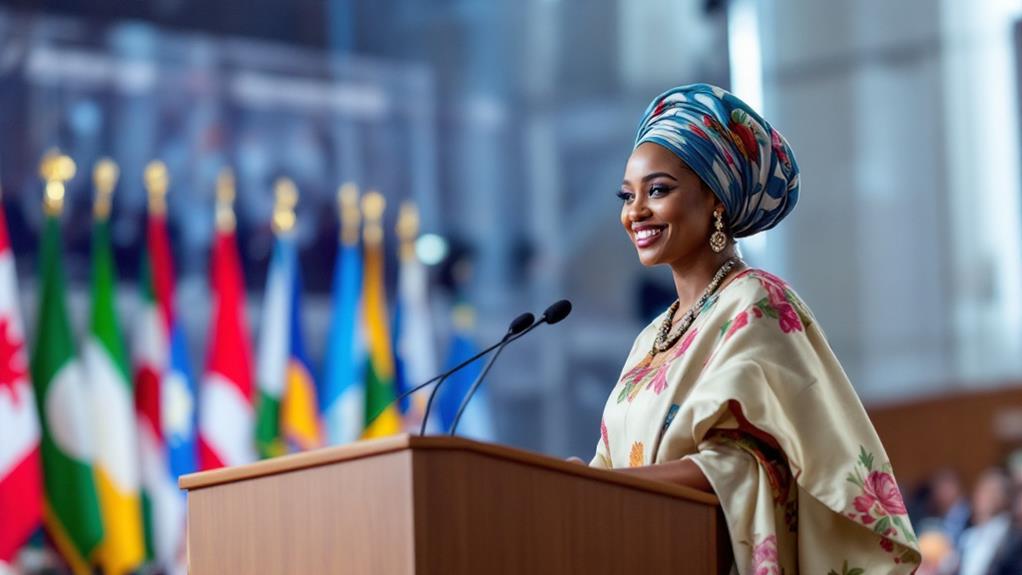
When you look at the global stage, you'll find Nigerians stepping up to lead some of the world's most influential organizations. Emeka Anyaoku broke barriers as the first African to serve as Secretary-General of the Commonwealth of Nations from 1990 to 2000. Following in his footsteps, Ngozi Okonjo-Iweala made history as the first woman and first African to become Director-General of the World Trade Organization in 2021.
The United Nations has also seen Nigerian leadership, with Aminat J. Mohammed becoming the first Nigerian and second African woman to hold the position of UN Deputy Secretary-General. Her achievements were recognized with Nigeria's second-highest honor in 2022.
In the financial sector, Akinwunmi Adesina has taken major strides as President of the African Development Bank Group, overseeing its highest capital increase and winning the World Food Prize in 2017. Obiageli Ezekwesili, co-founder of Transparency International, has left her mark on both global finance and activism, serving as Vice President of the World Bank's Africa division and launching the Bring Back Our Girls campaign.
These leaders exemplify Nigeria's growing influence in shaping global policy and development.
Literary Giants and Cultural Ambassadors
Throughout the world, Nigerian literary giants and cultural ambassadors have left an enduring, permanent, lasting mark on global culture. You'll find Chinua Achebe's "Things Fall Apart" translated into over 40 languages, cementing his status as Nigeria's most influential writer. His work has opened doors for other Nigerian authors to gain international recognition.
Chimamanda Ngozi Adichie has broken barriers as the first Nigerian and youngest African to receive the UN Foundation Global Leadership Award. She's also the first African woman to be awarded Harvard's W.E.B Du Bois Medal, showcasing the growing influence of Nigerian literature on the global stage.
You can't discuss Nigerian cultural ambassadors without mentioning Fela Kuti, the pioneer of Afrobeat. By blending American blues, jazz, and funk with traditional Yoruba music, he created a unique sound that gave voice to Nigeria's masses.
Wole Soyinka stands out as the first African to win the Nobel Prize for Literature in 1986. He's used his platform to criticize undemocratic governments and corruption in Nigeria. Tragically, Ken Saro-Wiwa paid the ultimate price for his environmental activism and criticism of the military regime, showing the risks some Nigerian writers face in their quest for justice.
Pioneers in Science and Technology

Nigerian innovators have made notable advancements in science and technology, pushing the boundaries of what's possible on the global stage. You'll find trailblazers like Philip Emeagwali, known as the "father of the internet" for his pioneering work in parallel computing. This groundbreaking effort laid the foundation for the internet as we are aware of it today.
In the field of engineering, Oluwafemi Odumosu led the team that developed Nigeria's first locally made drone, showcasing the country's growing technological capabilities. Francisca Nneka Okeke broke barriers in physics, becoming the first African woman to win the prestigious L'Oréal-UNESCO For Women in Science Award for her research on Earth's magnetic field.
In the business world, Ashish Thakkar founded Mara Group, which has become a leading provider of technology and financial services across Africa. Meanwhile, Tomi Davies has been instrumental in supporting innovation by co-founding the Lagos Angel Network, one of Africa's first angel investing networks. This initiative has been essential in nurturing Nigerian startups, driving technological advancement and economic growth in the region.
Business Moguls and Entrepreneurs
Building on Nigeria's technological advancements, the country's business terrain has flourished with innovative entrepreneurs and visionary moguls. You'll find prominent Nigerian business leaders making waves across various sectors, from real estate to finance. These individuals have not only built successful companies but have also contributed to good governance and economic growth.
Take Aliko Dangote, for instance. He's Africa's richest man and has expanded his empire from cement to agriculture. You'll also find Ngozi Okonjo-Iweala, who served as Managing Director at the World Bank and now heads the World Trade Organization. She's the first woman and African to hold this position.
Here are some notable Nigerian business personalities:
- Tony Elumelu: Founder of UBA Group and philanthropist
- Folorunsho Alakija: Self-made billionaire in oil and fashion
- Oba Otudeko: Founder of Honeywell Group
- Ibukun Awosika: First female president of Lagos Chamber of Commerce
- Obinwanne Okeke: Once named the youngest African on Forbes' 30 Under 30 list
These entrepreneurs have not only achieved personal success but have also represented Nigeria on global platforms like the United Nations. They've paved the way for future generations, inspiring young Nigerians to dream big and contribute to their nation's economic prosperity.
Political Reformers and Activists
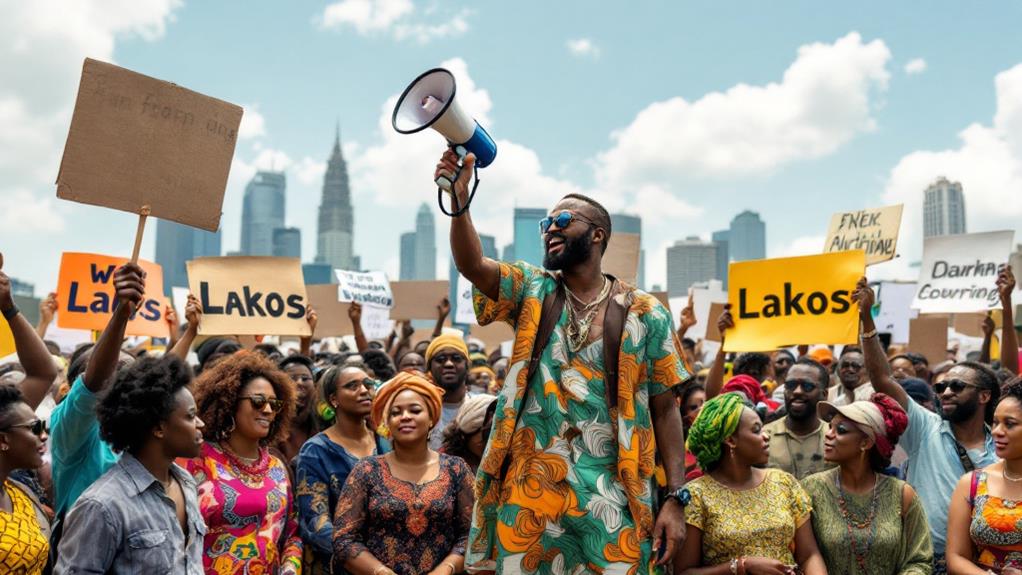
Nigeria's political terrain has been shaped by courageous reformers and activists who've fought tirelessly for justice, human rights, and social change. Among these trailblazers, you'll find Funmilayo Ransome-Kuti, a prominent women's rights activist who played a crucial role in Nigeria's fight for independence. As co-founder of the Abeokuta Women's Union (AWU), she led protests against colonial taxation and championed gender equality.
You'll also encounter Ken Saro-Wiwa, who launched the Movement for the Survival of the Ogoni People, fighting against environmental damage in the Niger Delta. Gani Fawehinmi, known as the "people's lawyer," challenged military rulers and faced repeated detention for his activism. In recent years, Obiageli Ezekwesili has been a powerful force for good governance and anti-corruption, co-founding Transparency International and leading the Bring Back Our Girls campaign. Aisha Yesufu, another fearless advocate, has been at the forefront of social justice movements, including the #EndSARS protests against police brutality. These activists have left a lasting mark on Nigerian society, inspiring future generations to continue the fight for a more just and equitable nation.
Groundbreaking Artists and Designers
Bursting with creativity and innovation, the Nigerian art scene has produced pioneering artists and designers who've left an enduring mark on the global stage. You'll find that these visionaries have reshaped perceptions of African art and design worldwide.
Ben Enwonwu, the first African artist commissioned by Queen Elizabeth II, paved the way for Nigeria's artistic recognition on the world stage. His contemporary, Demas Nwoko, pioneered a uniquely Nigerian modernist style, blending traditional aesthetics with modern structure.
Women have also played a vital role in Nigeria's art scene. Nike Davies-Okundaye, recipient of the Women's Leadership Award, revived the ancient Adire indigo-dyeing tradition, promoting it globally. Her work, like Chinua Achebe's novel "Things Fall Apart," showcases Nigeria's rich cultural heritage.
- Ben Enwonwu: Most influential African artist of the 20th century
- Demas Nwoko: Pioneered Nigerian modernist architecture
- Nike Davies-Okundaye: Revived Adire indigo-dyeing tradition
- Yinka Shonibare: Awarded CBE for services to the arts
- El Anatsui: Internationally acclaimed for large-scale installations
These artists have not only put Nigeria on the global art map but have also inspired a new generation of creatives to investigate their heritage and push boundaries in the United art world.
Humanitarians and Social Advocates
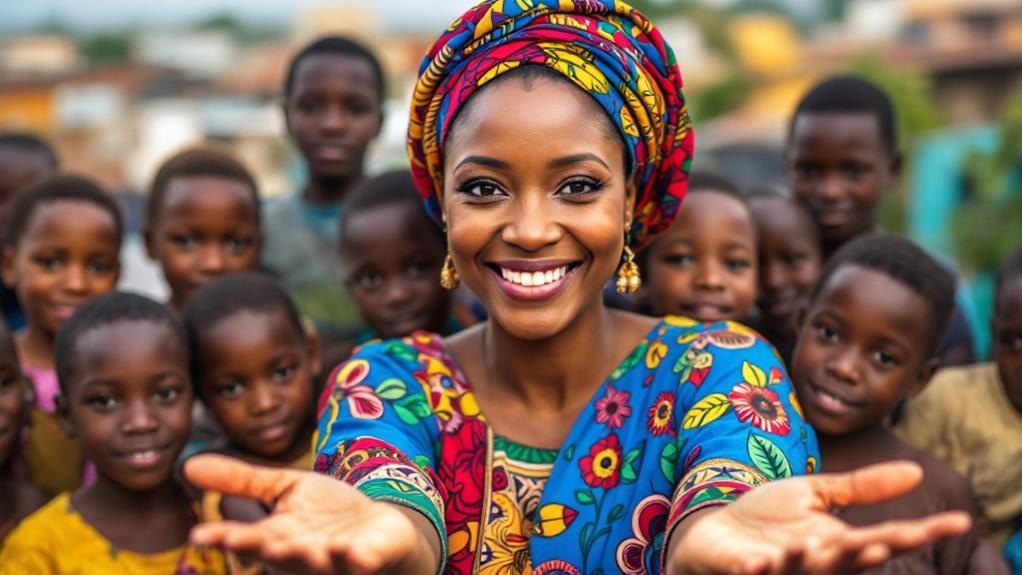
Five exceptional individuals stand out among Nigeria's humanitarians and social advocates, each leaving an unforgettable mark on the nation's fight for justice and equality. Ken Saro-Wiwa, a poet and environmental activist, launched the Movement for the Survival of the Ogoni People, challenging corporate exploitation until his controversial execution in 1995. Gani Fawehinmi, the "people's lawyer," fearlessly confronted military rulers and championed pro bono cases for the underprivileged.
Funmilayo Ransome-Kuti, a pioneering Nigerian activist, played a key role in women's enablement. She founded the Abeokuta Women's Union and led protests against colonial taxation. As the first woman and African to drive a car in Nigeria, she symbolized social transformation.
Hafsat Abiola founded the Kudirat Initiative for Democracy, focusing on equipping women and youth while advocating for human rights. Aisha Yesufu, a prominent voice in the #EndSARS movement, continues to fight for social justice in Nigeria.
These humanitarians and social advocates have shaped Nigeria's socio-political terrain, inspiring generations to stand up for their rights and challenge injustice. Their legacy continues to influence contemporary activism and social reform in the country.
